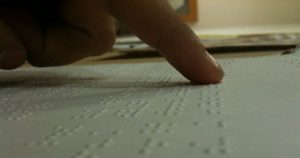
Organizing the general elections amid the COVID-19 pandemic could threaten the voting rights of vulnerable citizens. The organizer of the elections must come up with specific regulations to protect these marginalized voters’ rights.
Ariani Soekanwo, the chairwoman of the People with Disabilities’ Access to the General Elections Center (locally known under the acronym PPUA PENCA) said she was concerned that the upcoming simultaneous regional elections in December 2020 would not be sensitive to the special conditions of differentially abled (diffable) people.
PPUA PENCA is a local non-governmental organization working with diffable individuals often marginalized by society.
Ariani mentioned the requirement for voters to wear hand gloves, as mentioned in the COVID-19 prevention protocols, as being potentially unfriendly toward people with visual disabilities.
The General Elections Commission’s Regulation No. 6/2020 article 74 on simultaneous regional elections amid the non-natural disaster situation of the COVID-19 pandemic requires both voters and voting officers alike to wear single-use hand gloves during the election day. This requirement is part of the health safety protocol.
Ariani said despite being aware of the good intentions behind the protocol required by the regulation, she was concerned that these hand gloves would make it difficult for visually disabled voters to use the voting aids provided to accommodate their special needs.
“Other voters can just wear their gloves, but we (individuals with visual disabilities) cannot read the braille alphabets using hand gloves,” Ariani told Jaring.id upon being contacted on Wednesday, August 19, 2020.
She explained that hand gloves would give visually disabled voters a hard time fingering the braille voting aid with minimum height of 0.5 millimeters – printed in the shape of the voting ballot – given to them.
“How can you expect us to read documents using hand gloves when we already have a hard time when we have to handle objects using such gloves? Maybe just requiring us to use hand sanitizers is enough,” said the activist, who is known for her fight for the political rights of disabled individuals.
Besides not being able to use hand gloves, Ariani said that it was also difficult for diffable people to observe physical distancing protocols. Ariani went on to say that diffable individuals needed company when they were casting their votes, especially considering that the way that voting booths were constructed often neglected accessibility for diffable voters.
During the previous elections, according to Ariani, these disabled voters were usually accompanied by their family members or voting officers whom they trusted, as is again stipulated on the commission’s regulation No. 6/2020. During the context of the COVID-19 pandemic, the regulation can only apply to individuals whose minimum body temperature was 37.3 degree Celcius.
Ariani advised that family members accompanied people with disabilities to the polling booth, under the officers’ supervision. If these diffable individuals had no significant other to accompany them, then the officers could visit their houses to cast their votes from home instead, Arini continued. This is necessary to minimize contact between officers and voters.
The 2020 regional elections will be conducted across 270 regions in Indonesia covering nine provinces, 224 regencies and 37 cities. About 137,247 diffable voters would join the election.
Ariani said she perceived that Indonesia documented diffable voters in a haphazard way. One aspect she highlighted was how the data of visually and audibly disabled individuals were sorted under the single category of people with sensorial disabilities. She was of the opinion that the people having the two different categories of disability should be classified separately so the voting organizers could prepare voting aids according to the special needs of voters with different disability categories.
“Those who can’t see need voting aids which they can listen to and those who can’t hear need voting aids which they can look at,” Ariani said.
A General Elections Commission (locally known under the acronym KPU) member Viryan Aziz said the commission had always referred to Law No. 8/2016 on people with disabilities when they categorize voters’ data. The law classifies disabilities into four categories: physical, intellectual, mental as well as sensorial.
“The KPU is working in compliance with existing laws. It’s wrong for us to not work in compliance with the existing laws,” he told Jaring.id via text message on Monday, August 24, 2020.
The KPU has changed its classification of diffable voters for the 2020 regional elections under its regulation, which regulates the update process of voters data and longlist. Previously, during the 2019 elections the KPU classified diffable voters into five different categories of disability: physical, visual, auditory, mental and others.
Indonesia is not the only one
Indonesia is not the only country to decide to still move ahead in organizing its general elections amid the COVID-19 pandemic. At least 45 other countries have also organized their elections this year amid the pandemic. Asian countries which have conducted the elections this year include Burma, Malaysia, Singapore, South Korea and Sri Lanka.
Prodemocracy non-governmental organization Asian Democratic Network Program Manager Suh Soon-yoon mentioned South Korea as one of the countries which could be considered to have organized a successful election, protecting its citizens’ voting rights while simultaneously protecting their health safety through strict protocols during the pandemic.
Aside from setting up health safety protocols, South Korea was also able to provide various high-technology equipment and internet connection during the campaign period. The Eastern Asian country also did not hesitate to disburse a bigger fund to employ more voting officers in the field.
“South Korea has the means to employ more people in the voting booths and provide personal protection equipment to the voters,” Soon-yoon said upon being contacted on June 26, 2020.
Yet, speaking of marginalized voters, about more than 3,400 kilometers away from the South Korea, a minority group in Rakhine, Myanmar is under a looming threat of having their participation in the country’s upcoming elections on Nov. 8, 2020 cancelled. The reason: a worsening conflict between the Myanmar government’s military and a group of armed civilians.
The executive director of the People’s Alliance for Credible Elections Myanmar Sai Ye Kyaw Swar Mynt expressed his concern on ideas to postpone the elections in Rakhine.
He went on to say that the postponement could potentially take away the voting rights of Myanmar’s minority ethnic group. Mynt explained that in the previous elections, Rakhine became a stronghold of an ethnic-based political party called the Arakan National Party or ARP. The ARP is the stronger contender to the National League of Democrats Party or the NLD commanded by Myanmar’s state counsellor Aung San Suu Kyi.
“Rakhine is the only region in Myanmar where an ethnic group-based political party gained the majority of votes in 2015,” Mynt said during a discussion themed Strengthening Voters’ Role in Elections amid the Pandemic held on Tuesday, August 11, 2020.
Myanmar’s government, according to Sai, should have been able to guarantee the security and safety of voters, especially those who belong to minority ethnic groups. Unfortunately, he said, the pandemic had caused the elections organizers to delay their work. At this time, they haven’t even implemented the technical regulations regarding the upcoming elections, according to Mynt.
He went on to say that the organizers were yet to discuss matters related health safety protocols to protect both the voters and organizers alike from the virus.
“The COVID-19 situation in Myanmar is not that bad, yet many people fear a second wave outbreak which comes with the opening of its borders with Thailand,” Mynt explained.
Separately contacted, International Institute for Democracy and Electoral Assistance (IDEA) Program Manager Adhy Aman said the COVID-19 pandemic was a huge blow to democracy, especially when it came to conducting general elections across several countries. He also agreed that marginalized communities – such as people with disabilities, women, immigrants, prisoners as well as members of minority ethnic groups – would have a much more difficult time casting their vote.
“Voters with disabilities and those tested positive for COVID-19 who are under home quarantine or treated in a hospital would not be able to vote unless they are given special access,” he said.
In order for each country to guarantee its citizens’ voting rights, these elections need to be designed around strict health protection protocols, according to him. He said that elections’ organizers and lawmakers needed to mitigate the negative impacts associated with observing these protocols on marginalized voters. He added that we should not just stand and watch passively as these marginalized voters lost their voting rights in this year’s elections.
He advised that organizers reschedule the elections and postpone them until the COVID-19 infection curves in their respective countries already flattened. Several countries have already done that, including Japan, Malaysia, Mongolia, Singapore and Sri Lanka. This strategy could boost voter turnout while preventing new COVID-19 cases at the same time.
To specifically safeguard the voting rights of marginalized communities, Adhy reminded elections organizers and political parties to provide adequate information to voters. The information should comprise health protection protocols to vote safely, access to the nearest voting booth and candidates’ campaign materials.
“Elections organizers must implement distinctive voting mechanism specifically designed to cater to marginalized communities. These strategies include voting through postal services, early morning voting schedules as well as mobile voting booths,” he said.
According to the Sri Lanka-based Asian Network for Free Elections (Anfrel) Executive Director Chandanie Watawala, voting organizers and political parties alike have been relying heavily on social media to reach out to voters. Watawala said that they pay money to place campaign advertisements on Facebook and Google. According to Watawala, the use of social media as campaigning platforms had been able to maintain Sri Lanka’s voter participation rate in the election which was organized on August 8, 2020.
“Although the elections were conducted amid the pandemic situation, they had recorded a relatively high voter turnout of about 75 percent. This approximates the voter turnout in normal parliamentary elections situations,” she said.
In areas which are yet to be covered with internet connection, politicians have no other choice but conducting live face-to-face campaigns, joined by smaller crowds as the consequence of COVID-19-related health protection protocols. For instance, if any party bigwigs attended the campaigns, a crowd of maximum 500 people is allowed. Meanwhile, if no political party higher-ups attend the campaigns, then only a maximum of 300 people are allowed to attend.
The Sri Lankan general elections commission also once suggested that an alternative voting system such as early morning shifts was made available to hospitalized and elderly voters as well as those who lived abroad. Yet, political parties rejected the proposal, which comes from elections organizers and civil society organizations.
“We have seen South Korea successfully boosted voter turnout thanks its early voting shifts. Yet, we failed to apply the same strategy in Sri Lanka,” she said.
Similar to Sri Lanka, Indonesia is unable to apply different voting methods during the pandemic situation. The problem lies with the Government Regulation in lieu of law on simultaneous regional elections in 2020 which regulates only elections schedules during the pandemic, with the voting process left unchanged.
Voters must come to the polling stations to cast their ballots by voting for one candidate. If the General Elections Commission imposed the application of several voting alternatives, then the Association for Elections and Democracy Executive Director Khoirunnisa Nur Agustyati said that the elections’ organizers had set themselves up for lawsuits.
“It is time to change not only the local elections’ regulations, but also changing the Indonesian general elections regulations, which is currently under revision,” she said.







